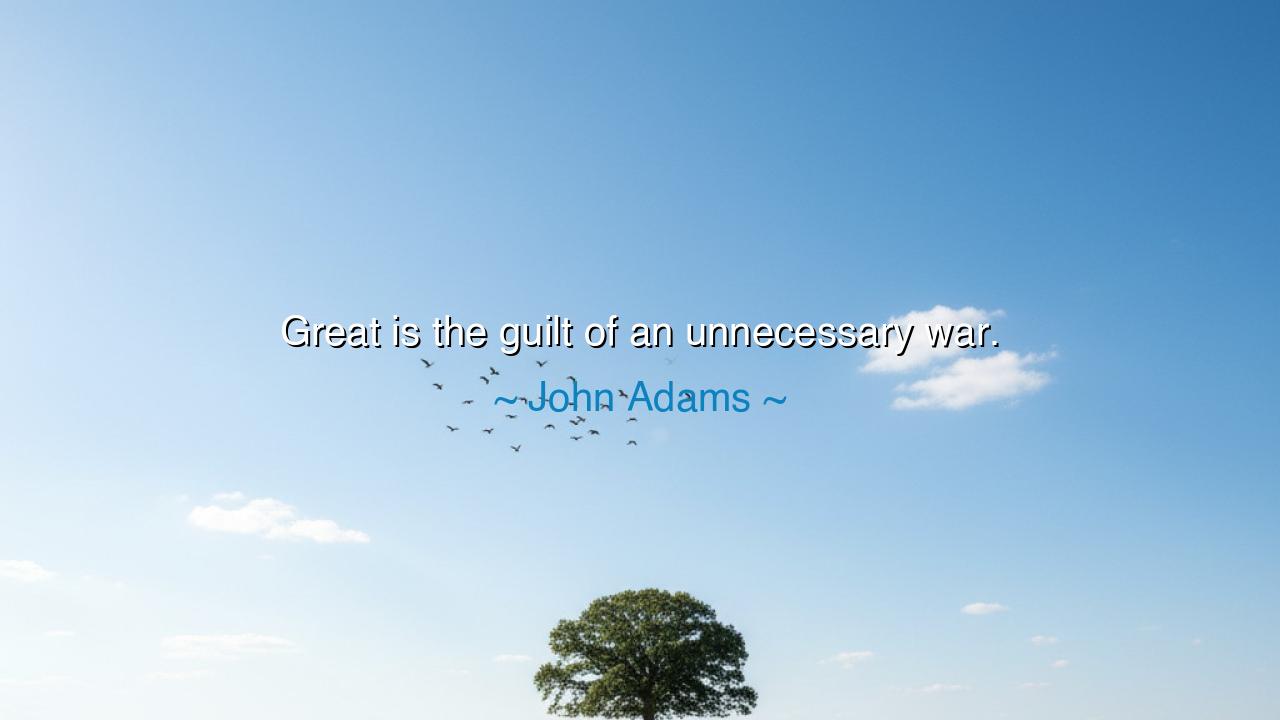
Great is the guilt of an unnecessary war.






In the words of John Adams, “Great is the guilt of an unnecessary war.” This saying stands like a thunderbolt of conscience hurled across the centuries — a warning not merely to kings and generals, but to all humankind. It is the cry of wisdom born from sorrow, spoken by one who knew the cost of liberty and the weight of leadership. These words remind us that though war may sometimes be righteous, the war that need not be fought — that is a crime not only against nations, but against the human spirit itself. The guilt of such a war does not rest on one man’s shoulders; it spreads like shadow, staining all who could have chosen peace and did not.
The origin of this quote lies in the heart of a statesman who understood both the necessity and the peril of conflict. John Adams, second President of the United States, was no stranger to the fires of revolution. He had seen the birth of his nation through battle and blood, but he also knew that war is a monster that devours the innocent and the guilty alike. Having endured the storm of the American Revolution, Adams sought peace wherever possible thereafter, even when it was unpopular to do so. His words came not from cowardice, but from courage — the courage to resist the seductive drumbeat of glory that so often leads men to ruin.
For in every age, there are those who long for war as others long for music — who see in it a stage for power, pride, and revenge. Yet Adams’s warning reveals a higher truth: that war is not a stage, but a graveyard. The guilt of an unnecessary war is great because its price is paid in the blood of those who never chose it. The farmer, the child, the mother — they become the victims of ambition disguised as patriotism. To wage such a war is to gamble with souls, to call upon the divine winds of justice only to unleash chaos instead. It is to mock the very order of Heaven, where peace is the highest law.
History bears witness to the truth of Adams’s words. Consider the Crimean War of the nineteenth century — a conflict born not of necessity, but of pride and political maneuvering among empires. Hundreds of thousands perished for little gain, and when the smoke cleared, the world was no better, only wearier. Or the Vietnam War, in which generations were torn apart by the illusion that one more battle, one more death, could achieve what diplomacy could not. In every such case, the victors gained only ashes, and the vanquished lost not merely lives, but faith in the righteousness of mankind. These are the echoes of Adams’s warning — the guilt of unnecessary war written in the tears of history.
Yet the ancients, too, knew this truth. Marcus Aurelius, the philosopher-emperor of Rome, once wrote that “the best revenge is not to be like your enemy.” He understood that true strength lies not in conquest, but in restraint. The man who can raise the sword and does not — that man is greater than the one who wields it. For peace requires a bravery beyond the battlefield: it demands wisdom, patience, and the humility to understand that not every provocation must be met with blood. Adams’s words are a mirror to this ancient truth — that power without wisdom becomes guilt, and that to fight without cause is to war against one’s own soul.
There is, however, a time when war is not a sin but a duty — when freedom, justice, or the innocent are under siege. Adams himself fought for liberty, yet his wisdom teaches that such wars must be the last resort, not the first impulse. The unnecessary war is the one born of vanity, greed, or fear — the war that could have been averted through understanding. To recognize that difference is the burden of every leader, every citizen, every generation. Those who choose war lightly inherit its guilt; those who prevent it earn the blessings of posterity.
Let this be the lesson for our time and all time: the measure of civilization is not how quickly it draws the sword, but how long it can hold its hand. Seek justice, but not vengeance. Defend the innocent, but do not lust for conflict. And when peace seems difficult, remember that peace is the true labor of the strong. The guilt of unnecessary war is heavy because it is eternal — its victims do not vanish with time, for their voices echo through the ages, pleading with us to choose differently.
So, my children of the present age, take this teaching to heart. Be warriors of wisdom, not of wrath. When you are provoked, seek to understand; when you are wronged, strive to forgive; and when you must fight, fight only for what is right, never for pride or power. For in every war that need not be fought, humanity wages battle against itself — and in such a war, there are no victors, only the haunting silence of what might have been peace.






AAdministratorAdministrator
Welcome, honored guests. Please leave a comment, we will respond soon